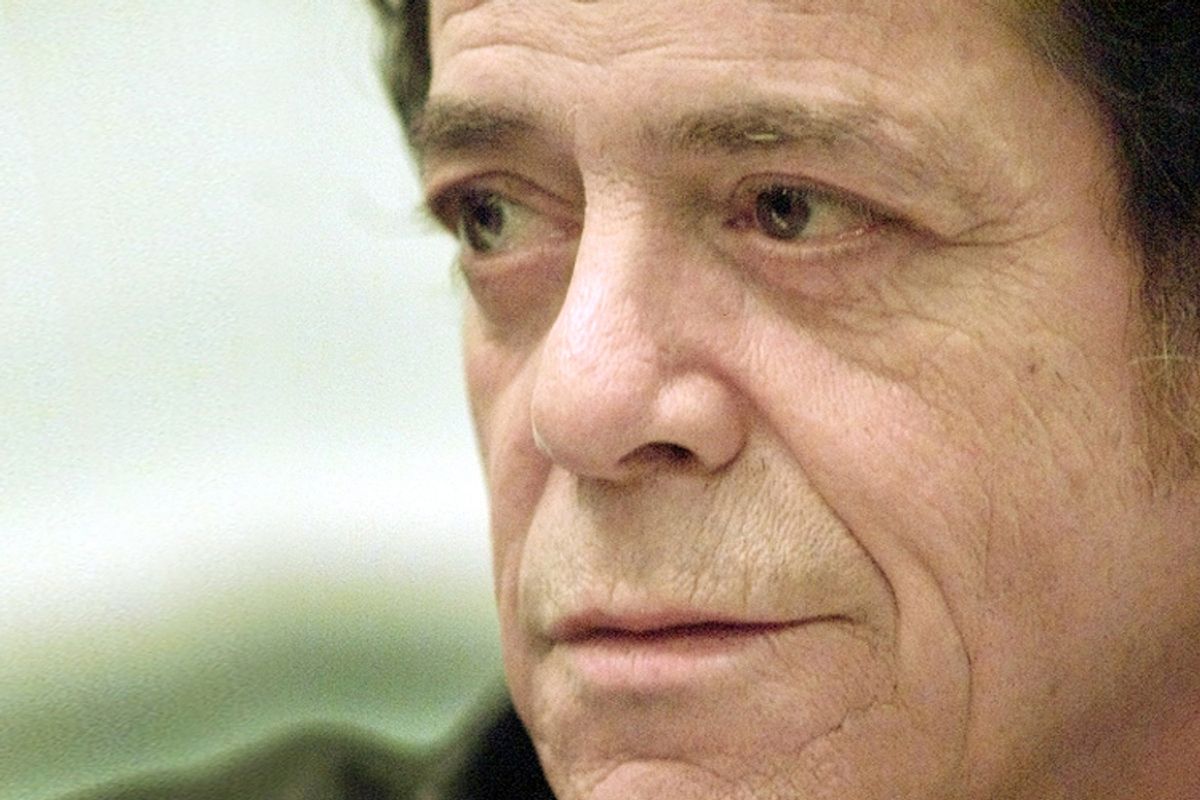I was in my basement polishing the acetate of my producer’s cut of "Metal Machine Music" when I heard that Lou Reed had died. The news came to me, as such news often does, from a German magazine editor. He called me on the special phone that I keep aside for foreign publications that want me to write about the American music scene.
“Lou Reed ist tot,” he said.
“I’m sorry,” I said. “I don’t speak German.”
“Lou Reed is dead.”
“Oh Lou,” I said. “Oh God. Oh no.”
I took about 15 minutes to weep silently, mostly for myself, but also on behalf of all cultured people everywhere. Lou Reed’s music was too beautiful for this world, though rarely too beautiful for NPR. Now his music, and the feelings it swelled in the breasts of the educated, was no more.
The phone rang again, and again, and again. Crying time had ended for me, at least temporarily. I’d write many obituaries that mournful Sunday. Hard work is its own reward. That’s what Lou would have said. It’s what Lou would have wanted.
* * *
Not to be a jerk about it, but Lou Reed meant more to me than he did to you. No single human being, not even Jean-Luc Godard or David Foster Wallace, has influenced my own life and art more. As a young critic for Rolling Stone, I saw the Velvet Underground play 350 times, sometimes hiding in air ducts so I could watch them during rehearsals. When I wasn’t seeing them live, I was listening to their albums, taking notes with permanent marker, always sober, occasionally touching myself gently and rhythmically. The music left an imprint on my soul that the destructive sands of history cannot erase.
When the Velvets inevitably, tragically, dissipated, I became the foremost chronicler of Lou Reed’s solo career. I interviewed him on 27 separate occasions, about half with his consent, and attempted to interview him at least 100 more times. Our relationship was electric and explosive and sometimes enervating.
One day about two decades ago, when the world was still inexpensive and young and dying of AIDS, I saw Lou and Laurie Anderson walking through the East Village holding hands, as avant-garde performers in love are wont to do. Fortunately, I had my notebook handy, since I was working on my own (still unpublished) epic tone poem about Lower Manhattan.
“Hey, Lou!” I shouted.
He turned. A look of what some people would call horror but I’d call joy filled his face.
“It’s me!” I said.
“Oh God,” he said.
“Do you have time to talk right now?”
Lou turned to Laurie.
“Run,” he said. “Save yourself.”
I chased Lou through Tompkins Square Park. We dodged the needles and the people living in boxes. I saw Iggy Pop sitting on a bench, passing him because I knew Iggy would always be there if I needed him, tomorrow and the next day. Lou, on the other hand, was elusive quarry. He tended to emerge only in the evenings, spending time in restaurants surrounded by people who didn’t appreciate him as much as I did.
But on that day, I was overweight. And he was faster than I was.
“Leave me alone, you goddamn freak!” Lou Reed shouted to me. “Haven’t you sucked my marrow enough?”
Those were special lyrics, just for me. Even Lou’s insults sounded like poetry. It was such a perfect day. I was glad I’d spent it with him.
* * *
I have photograph of Lou Reed that I gaze at some nights, late, while listening to a special edition of "Transformer" that was released mostly for the Japanese market. It’s of a young Lou, circa 1973, before he turned into the wizened suburban toad of late middle age. In my special photo, he stands at his window in the East Village shirtless -- but still in sunglasses -- nonchalantly smoking a joint. I squatted in an alley for 16 hours so I could get that shot. And it’s mine. I use it for artistic inspiration. I use it to emote. I use it all the time.
Now that most of my deadlines have passed, I weep afresh for the world’s loss. How could I not? The fabric of reality has been torn asunder. Because when you think of what Lou Reed meant to American culture, the meaning is really meaningful. He was our champion of the avant-garde, our greatest junkie bard, the ultimate maestro of the obtuse, and he looked good in leather for pretty much his entire life. Lou felt everything that true music fans feel, and he expressed that feeling times a thousand, on multiple instruments. He sang for all of us, especially for those of us who never took singing lessons. And if you’ve ever lived in New York -- which I have, alone, in the same three-bedroom basement apartment since 1964, when I was 17 years old -- he spoke of the city like no one else ever could, with authenticity, meaning, grit. His New York always had a needle in its arm and poetry in its soul.
Lou Reed is dead. Even if someone were to invent time travel tomorrow and journey to 1977 to bring him to the present, it would still be over, because the temporal paradox would cause reality to collapse in on itself. I know and understand that. But regardless, I’ll always struggle with the final words he said to me, back in 2003:
“Get that tape recorder out of my face, you stinking leech.”
Oh, Lou. Sweet sweet Lou. New York may have cleaned up its boulevards a dozen years ago. But they’ll always be dirty for you!



Shares